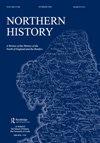维多利亚时代泰恩河畔纽卡斯尔的验尸官和医疗行业“……对医疗行业的敌意和犯罪很少被禁止。”
IF 0.2
3区 历史学
Q2 HISTORY
引用次数: 0
摘要
对19世纪英国验尸官的研究表明,验尸越来越医学化。这项研究的大部分是在伦敦进行的。我的研究表明,在泰恩河畔的纽卡斯尔,医学并没有占据主导地位:律师验尸官利用他的技能和知识来维持调查的法律焦点。这项研究揭示了具有法律资格的验尸官与当地医疗行业之间令人着迷的动态关系。通过对纽卡斯尔验尸官和医学界之间相互作用的例子进行分析,本文对维多利亚验尸官法庭中医学和法律之间关系的学术研究做出了重大贡献。我对一个重要的省级城镇的调查提供了见解,并发现验尸官将纽卡斯尔法院从官方建筑迁到了它的传统住所——酒店。而不是一个增加医疗化的故事,纽卡斯尔的调查是坚定的法律保护。验尸官个人的性格和选择对验尸法庭的法律与医学关系有着重要的影响。我试图鼓励对验尸官的工作进行进一步的研究,以更全面地了解19世纪的调查。本文章由计算机程序翻译,如有差异,请以英文原文为准。
The Coroner and the Medical Profession in Victorian Newcastle Upon Tyne ‘… Antagonism and Offence Towards the Medical Profession Such as has Rarely Been Exhibited.’
Studies of the coroner in nineteenth century England suggest that inquests became increasingly medicalised. Much of this research was conducted in London. My research reveals that in Newcastle upon Tyne medicine did not dominate: the solicitor coroner used his skills and knowledge to maintain the legal focus of the inquest. This study reveals a fascinating dynamic between the legally qualified coroner and the local medical profession. In presenting an analysis of examples of the interactions between the Newcastle coroner and the medical profession, this article makes a significant contribution to scholarship on the relationship between medicine and law in the Victorian coroner’s court. I offer insight into inquests in an important provincial town and discover that the coroner relocated the Newcastle court from official buildings to the public house, its traditional home. Rather than a story of increased medicalisation, the inquest in Newcastle was firmly the preserve of the law. The character and choices of an individual coroner are revealed to have a significant impact on the relationship between law and medicine in the coroner’s court. I seek to encourage further research into the work of coroners, to develop a fuller picture of the inquest in the nineteenth century.
求助全文
通过发布文献求助,成功后即可免费获取论文全文。
去求助
来源期刊

Northern History
Multiple-
CiteScore
0.20
自引率
33.30%
发文量
37
期刊介绍:
Northern History was the first regional historical journal. Produced since 1966 under the auspices of the School of History, University of Leeds, its purpose is to publish scholarly work on the history of the seven historic Northern counties of England: Cheshire, Cumberland, Durham, Lancashire, Northumberland, Westmorland and Yorkshire. Since it was launched it has always been a refereed journal, attracting articles on Northern subjects from historians in many parts of the world.
 求助内容:
求助内容: 应助结果提醒方式:
应助结果提醒方式:


